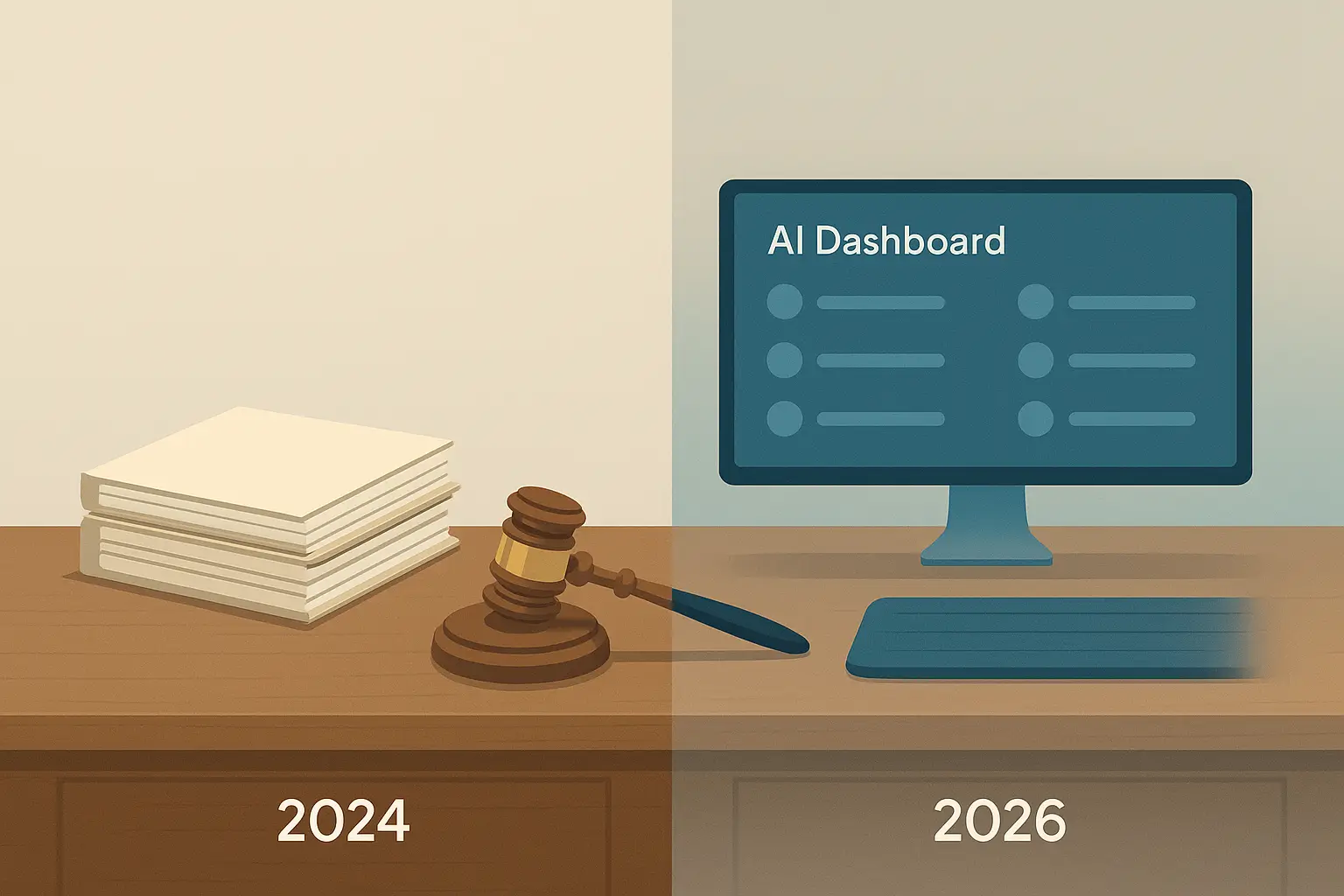As we all know Artificial Intelligence (AI), is spreading its wing and disrupting every industry as we speak, legal industry is not an exception. AI in law firms isn’t just a buzzword anymore. It is genuinely changing how things get done. Instead of lawyers burning hours on tedious document review, AI steps in and handles it efficiently. That’s not just a minor time-saver, either. Thomson Reuters figures lawyers can reclaim about four hours a week, which translates to over $100,000 in additional billable time per lawyer each year. AI in law firms is not just innovation—it’s a serious boost to productivity.
Why AI in Law Firms Needs a Solid Foundation First
Imagine a renowned builder has built a 50-story skyscraper using all advanced techniques and technologies, but he has not paid enough attention while building the foundation and it is cracked. What’s the point? No matter how luxurious skyscraper is, it is not going to last longer. The same holds true for introducing AI into your law firm. Without strong operational systems in place, even the most powerful AI tools in law firm workflow can collapse under pressure.
AI for legal isn’t just a magic fix, without the right foundation and groundwork it can backfire and even break the trust of the clients. To realize the full potential of AI, your law firm must first ensure that its workflows are consistent, compliant, and technology ready. In this blog, we’ll walk you through the essential steps to successfully prepare your law firm for AI adoption.
Evaluate your Current Workflow
Start by mapping out exactly how your team handles timesheets, invoicing, and client data. Is everything organized, or are documents scattered between emails, shared drives, and—worst of all—paper files. If your billing process isn’t consistent every time, that’s another red flag.
As per the article published by LawSites, AI in law firms isn’t a new thing. Nearly 38% of corporate legal teams are already working with AI, and 50% are seriously considering it. Still, AI for legal is not at all smooth sailing—people are worried about trust, data privacy, and honestly, a lot of firms have workflows that just aren’t clearly defined. If you want to keep up, it’s time to get the foundation of your law firm in order.
Establish a Solid Digital Framework First
Before implementing AI in law firm, automation of the processes is a must. If your firm’s digital processes aren’t in order, AI for legal will only amplify inefficiencies. You need organized, accessible, and secure data—that’s the backbone for any successful AI implementation.
That’s precisely where LegalWize fits in. While it’s not an AI legal software. LegalWize streamlines the essentials: accurate time tracking, compliant invoicing, secure document storage with proper access controls, trust account management, and audit-ready billing reports.
Here’s what LegalWize handles for your firm:
- Reliable time tracking and billable hour management
- GST-compliant invoicing
- Secure storage for documents with robust access control
- Hassle-free synchronization with existing accounting system like Tally, eliminating data duplication and manual entry.
- Billing reports that are always audit-ready
Before you start layering on AI in law firm, you need consistency and order in your operations. Adopting a comprehensive solution like LegalWize eliminates disorganization and sets your firm up for scalable, tech-driven growth. Skipping this step? Not an option if you’re serious about AI in your law firm workflow.
Train Your Team for Tech Readiness, Build Trust & Incentivize
AI in law firms won’t be successful without genuine employee engagement. As per the article published by Financial Times, firms like Crowell & Moring launched mandatory AI training and 45% of staff now use generative tools professionally.
So, how do you get there?
- Launch AI 101 workshops for every role
- Highlight realistic expectations and pitfalls
- Appoint AI champions to foster adoption
- Reward successful use cases internally
In the end, that’s how you cultivate trust and make sure that the AI in law firm workflow is welcomed, not just tolerated.
Pilot Low-Risk, High-Reward AI Use Cases
Once your workflows are digitized, it’s smart to start small with AI in legal testing tools that carry minimal risk but promise big gains:
- Invoice Review: Large Language Models can check invoices with around 92% accuracy in just 3.6 seconds, compared to 72% accuracy and ~200–300 seconds taken by experienced lawyers.
- Legal Research: Platforms like Westlaw Edge and Lexis+ AI deliver comprehensive case summaries in minutes.
- Document Review & EDiscovery: AI can swiftly sift through large volumes of documents to flag relevant clauses or duplicates.
- Client Intake Chatbots: Automate routine client questions while keeping the human touch for more complex interactions.
By starting with these targeted pilots, your firm can capture measurable efficiencies early, building confidence before expanding AI use into law firm workflow.
Prioritize Governance & Human Oversight
AI is not completely flawless— “hallucinations” (made-up information or false information), data privacy challenges, and loss of your firm’s authentic voice are real risks. So, while implementing AI in your law firms, lawyers must know that trusting AI blindly can be dangerous and harm the reputation of your law firm.
To manage these risks effectively-
- Keep humans in the loop – Make sure every AI-generated result is reviewed by a lawyer.
- Ensure robust data security – Use encrypted channels, SOC 2level systems, and GDPR/CCPA-compliant tools.
- Monitor AI results regularly – Prevent costly mistakes and keep workflows on track.
Final Thoughts
Should there be AI in law firms is not a topic of discussion or a debate anymore; it’s a question of when and how they’ll implement it. But here’s the reality: AI isn’t a cure for all. If your firm’s workflow isn’t already solid, bringing AI into your law firm workflow is just going to magnify existing issues. You’re looking at potential inefficiencies, data headaches, and, honestly, a hit to your reputation if things go sideways. Bottom line? Make sure your foundation’s strong before layering on the tech.
The right approach starts with the basics: digitizing your operations, standardizing processes, and implementing reliable tools that support compliance, accuracy, and scalability. This is where platforms like LegalWize play a vital role—not as an AI legal software, but as the essential infrastructure your firm needs to become AI-ready. AI for legal delivers real value only when implemented the right way.
If you are looking to strengthen your law firm workflows before embracing AI, book a demo today and take your first step toward a smarter, future-proof practice.




